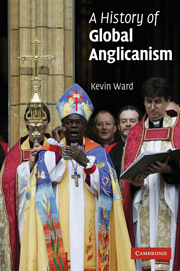Book contents
- Frontmatter
- Contents
- List of maps
- Preface
- List of abbreviations
- 1 Introduction: ‘not English, but Anglican’
- 2 The Atlantic isles and world Anglicanism
- 3 The United States
- 4 Canada
- 5 The Caribbean
- 6 Latin America
- 7 West Africa
- 8 Southern Africa
- 9 East Africa
- 10 The Middle East
- 11 South Asia
- 12 China
- 13 The Asian Pacific
- 14 Oceania
- 15 The Anglican communion: escaping the Anglo-Saxon captivity of the church?
- Maps
- Bibliography
- Index
15 - The Anglican communion: escaping the Anglo-Saxon captivity of the church?
Published online by Cambridge University Press: 04 May 2010
- Frontmatter
- Contents
- List of maps
- Preface
- List of abbreviations
- 1 Introduction: ‘not English, but Anglican’
- 2 The Atlantic isles and world Anglicanism
- 3 The United States
- 4 Canada
- 5 The Caribbean
- 6 Latin America
- 7 West Africa
- 8 Southern Africa
- 9 East Africa
- 10 The Middle East
- 11 South Asia
- 12 China
- 13 The Asian Pacific
- 14 Oceania
- 15 The Anglican communion: escaping the Anglo-Saxon captivity of the church?
- Maps
- Bibliography
- Index
Summary
Ecclesia Anglicana by virtue of its provenance is English in texture and fibre …
All too often the bishop has become a carbon copy of the English bishop whose office and style has been accommodated to the English culture, particularly the upper-class culture. A classic example is the African bishop being addressed as the Lord Bishop of Cape Coast or Tamale or Freetown. The title reflects an English culture and social structure which are irrelevant to the African situation … While African or Asian or Pacific Anglicans contribute to their own captivity to the Anglo-Saxon ecclesia Anglicana, the captivity is also imposed from outside.
This extract from an essay by John Pobee, a Ghanaian Anglican, comes from Sykes and Booty's 1988 Study of Anglicanism. As if to reinforce the ‘Anglo-Saxon captivity’, Pobee's contribution is the only one to emanate from the South. The aim of the present book has been to demonstrate that, despite the burdens of colonialism and the ‘colonisation of the consciousness’ to which Pobee adverts, indigenous forms of local Anglicanism have asserted themselves. Even they, however, have been discounted and marginalised in thinking about the nature of Anglicanism. In 1965 the theologian Anthony Hanson could say of Anglicanism
… this Communion is still astonishingly English in complexion. Indeed it is probably in this respect the most monochrome of all world denominations … the Church of England on the whole goes its way without paying much attention to the opinion and reactions of the rest of the Anglican Communion, whereas the rest of the Anglican Communion on the whole tends to look to the Church of England for approbation before any important step is taken.
- Type
- Chapter
- Information
- A History of Global Anglicanism , pp. 296 - 318Publisher: Cambridge University PressPrint publication year: 2006



